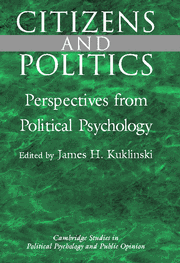Book contents
- Frontmatter
- Contents
- List of Contributors
- Prologue: Political Psychology and the Study of Citizens and Politics
- PART I AFFECT AND EMOTIONS
- PART II POLITICAL COGNITION
- PART III POLITICAL ATTITUDES AND PERCEPTIONS
- PART IV POLITICAL VALUES
- Introduction
- 13 Social Welfare Attitudes and the Humanitarian Sensibility
- 14 American Individualism Reconsidered
- 15 Political Value Judgments
- 16 Commentary: The Study of Values
- 17 Commentary: The Value of Politics
- Index
- Titles in the series
17 - Commentary: The Value of Politics
Published online by Cambridge University Press: 07 October 2011
- Frontmatter
- Contents
- List of Contributors
- Prologue: Political Psychology and the Study of Citizens and Politics
- PART I AFFECT AND EMOTIONS
- PART II POLITICAL COGNITION
- PART III POLITICAL ATTITUDES AND PERCEPTIONS
- PART IV POLITICAL VALUES
- Introduction
- 13 Social Welfare Attitudes and the Humanitarian Sensibility
- 14 American Individualism Reconsidered
- 15 Political Value Judgments
- 16 Commentary: The Study of Values
- 17 Commentary: The Value of Politics
- Index
- Titles in the series
Summary
A significant group of empirical researchers are beginning to engage questions that, at least according to recent convention, have been considered the province of political philosophers. Some political scientists are taking so-called normative issues more seriously and centrally. They are looking for ways to join questions of value to their more usual topics of interest and power. Arguably, a complementary shift is at work in political philosophy, where many increasingly regard issues of power, hegemony, interest, and the like to be inseparable from more traditional concerns with principles and ideals. Both of these shifts suggest the need to rethink some of our most basic ideas. For instance, predominant understandings that oppose value and interest, principle and power, may require rethinking. What is more, reconceiving the relationship between these issues may yield a reappraisal of politics.
THE POLITICS OF PUBLIC OPINION RESEARCH
The array of issues encompassed by the catchall term “opinion formation” pose and pursue a variety of crucial questions: What mix of emotion, interest, and value prevails in citizens' opinions? What are interests, feelings, and values? In what measure are political opinions affective or cognitive? More generally, what is a political opinion, where do political opinions come from, and what do they express? Recent efforts to recover the evaluative basis of public opinion pursue these as political theoretical questions.
- Type
- Chapter
- Information
- Citizens and PoliticsPerspectives from Political Psychology, pp. 480 - 504Publisher: Cambridge University PressPrint publication year: 2001

